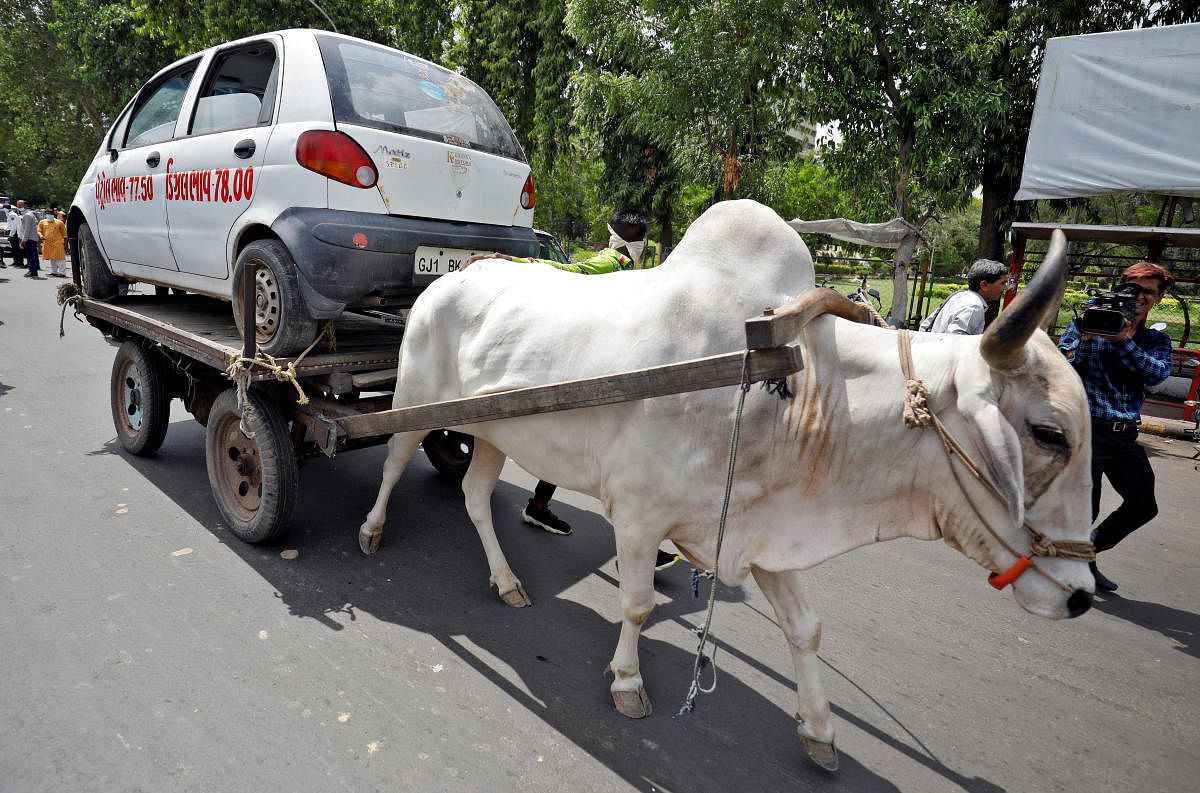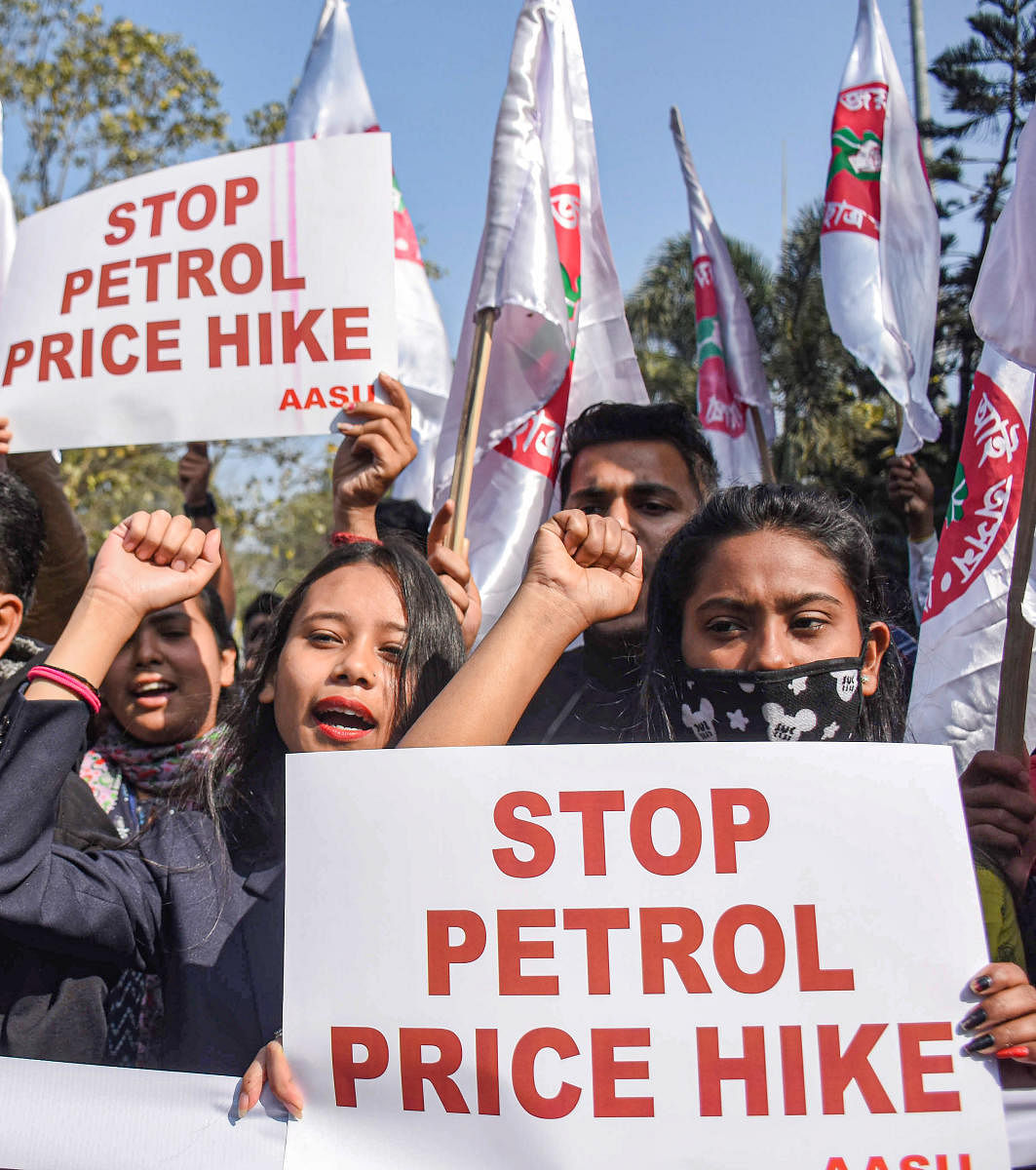

Ashish Kumar drives a taxi in Mumbai. A few months ago, he was employed in a factory, which laid him off in the wake of the economic crisis.
Kumar, who is from Alwar in Rajasthan, took a bank loan to finance the taxi he drives now. Already hit by dwindling income due to fewer trips in the time of the pandemic, the soaring petrol prices have pushed him to the brink: He earns Rs 10,000 a month while his expenditure stands at Rs 15,000.
"I am planning to shift back to Alwar now," he says, amid rising anger against the government.
Kumar isn't alone. The rising fuel prices have dented the finances of hundreds and thousands of taxi drivers, as well as the middle class.
"Fuel price hike will have a pass-through effect across a wide range of products and services. It will not only raise prices but also impact consumption. This can be a setback to the nascent economic recovery," said Kavita Chacko, senior economist, Care Ratings.
The relentless price hike by the Centre comes at a time when Assembly elections are around the corner in four states and a Union Territory. In fact, Finance Minister Nirmala Sitharaman termed the rising prices a "dharm sankat" situation.
In Bengaluru, petrol is selling at Rs 93.98 a litre — a rise of almost 10% since the beginning of the year. In Mumbai, where Kumar is struggling to make ends meet, petrol costs Rs 97.34 a litre.
But there is more to petrol prices than meets the eye. With crude oil prices under check at around $60 a barrel, the government is gaining a windfall of revenue from it in the form of taxes.
While the Centre might have trumpeted the one-nation-one-tax regime under GST, fuel and alcohol — the two cash cows for the government — have been kept off it. They are, hence, taxed under the old regime.
Without taxes, the cost of petrol is Rs 32.1 per litre. The excise duty on petrol, which goes directly to the Centre’s kitty, stands at a whopping Rs 32.9 a litre. Despite the Centre trying to share the blame for rising prices with the states, the Value Added Tax (VAT), which goes to the state, is, on an average, Rs 20.6. The central excise duty is fixed in nature, but VAT — which is levied by the respective state governments — is ad valorem.
After all these are accounted for, the dealers add Rs 3.7 a litre as their commission.
Presently, the government is able to collect around 167% taxes, (excise duty and VAT) on the base price of petrol, and 129% in the case of diesel. Taxes now make up around 60% of the retail price of petrol, and 55% of the retail price of diesel.
Analysts say that at a time when the government is giving heavy tax concessions to corporates, it is trying to finance its deficit through fuel prices, which pinches the common people.
Looting, not taxation
“The Modi government pats the rich and taps the poor and middle class. It believes that the poor and middle class are voiceless and will pay whatever the price may be for petrol, diesel and cooking gas. This is looting, not taxation,” said Congress leader and former finance minister P Chidambaram.
In the first half of FY-21, Rs 2.10 lakh crore has been generated by the government through excise duty and VAT collection on petroproducts. During FY-20, 78% of the amount came from excise duties and the balance from crude oil cess and customs, royalties and CGST. Union excise collections on oil products were Rs 2.23 lakh crore out of the total of Rs 3.34 lakh crore under this heading of the central government.
Effect on inflation
But why are rising petrol prices not leading to increased inflation?
Petrol and diesel have a combined weight of 4.69% in the wholesale price index (WPI) and 2.34% in the consumer price index (CPI). On the other hand, food makes up 50% of the consumer inflation basket. So, while an increase in food prices will have a quick impact on inflation print, the rise in fuel prices will have a gradual and slow impact on it. Also, any increase in the prices of auto fuels will affect the WPI more than the CPI.
But then, record-high prices for diesel means that the cost of transporting goods goes up across the country, which in turn could result in increasing prices of essential commodities like fruit and vegetables as well.
Quite clearly, this group of products is very important for the government for raising revenue.
Presently, it appears that the government would rather not lower the tax rates as it would impact revenue collections.